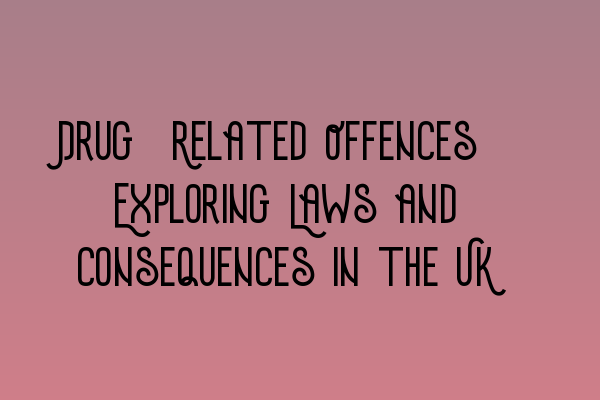Drug-Related Offences: Exploring Laws and Consequences in the UK
Drug-related offences are prevalent in the UK, and understanding the laws surrounding these offences is crucial. Whether you are a law student preparing for the SQE 1 or SQE 2 exams or someone seeking knowledge about drug offences, this article will provide you with a comprehensive overview of the topic.
Categories of Drug Offences
Drug offences in the UK are broadly categorized into possession, supply, and production. Possession refers to the act of knowingly having illegal drugs in one’s possession. Supply includes selling, offering to sell, or even sharing drugs with others. Production denotes the cultivation, manufacturing, or preparation of illegal drugs.
To grasp the severity of these offences, let’s delve into the specific laws and consequences associated with drug-related offences.
Possession of Drugs
Illegal drug possession is a serious offence in the UK. The Misuse of Drugs Act 1971 establishes the illegality of certain controlled substances. The law categorizes drugs into different classes: Class A, Class B, and Class C.
Class A drugs, such as heroin, cocaine, and ecstasy, are considered the most harmful and attract the most severe penalties. Possession of a Class A drug can result in imprisonment for up to seven years and/or an unlimited fine.
Class B drugs, including cannabis, amphetamines, and ketamine, carry lesser penalties than Class A drugs. Possession of a Class B drug can lead to a maximum prison sentence of five years and/or an unlimited fine.
Class C drugs, which include tranquilizers, anabolic steroids, and some painkillers, usually result in lesser penalties compared to Class A and B drugs. Possession of a Class C drug can lead to imprisonment for up to two years and/or a fine.
It is essential to note that the penalties for possession can vary depending on the specific circumstances of the case, such as the quantity of drugs found and the offender’s intent.
Supply and Production of Drugs
Supplying drugs refers to the act of providing or selling illegal substances to others. Drug supply charges are commonly associated with the intent to distribute drugs, and the penalties are significantly harsher than those for possession.
The consequences for drug supply and production vary depending on the drug’s class and quantity involved, as well as the offender’s role in the operation. The potential penalties range from several years of imprisonment to life imprisonment, accompanied by hefty fines.
Engaging in drug production, such as cultivating cannabis or manufacturing drugs, is also taken extremely seriously. Both supply and production offences are deemed as major criminal activities and are met with severe legal consequences.
Consequences and Rehabilitation
The penalties for drug-related offences in the UK are undoubtedly severe due to the inherent dangers and societal impact associated with drug abuse. However, it is important to note that the UK legal system also focuses on rehabilitation and offers support to individuals struggling with drug addiction.
If a person is convicted of a drug-related offence, they may be offered various rehabilitation programs to help them address their addiction. These programs aim to assist offenders in overcoming their substance abuse and reintegrating them into society as law-abiding citizens.
It is crucial for legal professionals to understand the complexities of drug addiction and its impact on individuals to effectively represent their clients involved in drug-related offences.
Preparing for the SQE Exams
If you are a law student preparing for the SQE 1 or SQE 2 exams, it is essential to have a comprehensive understanding of drug-related offences and the laws surrounding them. Proper knowledge of this topic will enable you to tackle related questions and scenarios that may arise in the exam.
To enhance your preparation for the SQE exams, take advantage of practice resources available online. Make use of SQE 1 Practice Exam Questions that simulate real exam scenarios, allowing you to assess your knowledge and identify areas for improvement.
In addition, it is crucial to attempt mock exams to familiarize yourself with the structure and format of the SQE exams. SQE 1 Practice Mocks FLK1 FLK2 provide an excellent opportunity to test your skills and gain confidence before the actual exam.
For a comprehensive understanding of Criminal Law and Practice required for the SQE exams, consider enrolling in SQE 2 Preparation Courses. These courses are designed to cover all the necessary knowledge and provide you with the guidance needed to succeed in the exams.
Moreover, don’t forget to check out SQE 1 Preparation Courses to ensure you have a strong foundation in all the relevant legal areas.
Conclusion
Drug-related offences carry severe legal and societal consequences in the UK. Understanding the laws surrounding drug possession, supply, and production is vital for legal professionals and individuals alike.
Aspiring solicitors preparing for the SQE exams should ensure they have a solid grasp of drug-related offences and their implications. Utilizing practice resources and enrolling in comprehensive preparation courses will enhance their chances of success.
Remember, the fight against drug-related offences involves not only enforcement and punishment but also efforts to rehabilitate and support individuals struggling with addiction.
For more information about the SQE exams and important dates, visit the SRA SQE Exam Dates page.
